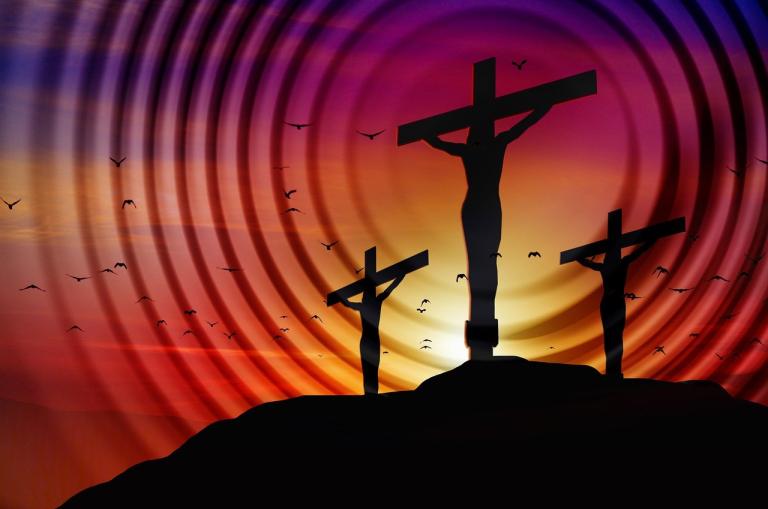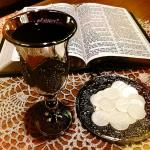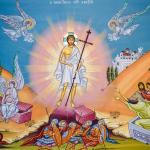What happened at Christ’s crucifixion was an act of divine omnipotence that was more monumental, more miraculous, and more mind-blowing than the Creation. It entailed, in effect, a cataclysm within the Godhead, involving, if we can dare use this way of speaking, the inner psychology of the Holy Trinity.
Critics of the doctrine of the Atonement say that it would be unjust for God to punish Jesus for what we have done. And if Jesus is God’s son, then he would be committing “cosmic child abuse.” But God did not select a mere man, related to Him or not, as a human sacrifice. That would not only be unjust, it would do no one any good. Rather, the man on the cross was God the Son, the Second Person of the Trinity.
So consider these staggering miracles that were taking place on that first Good Friday:
(1) God the Son took our suffering into Himself.
This aspect of the atonement is often overlooked, but it is a clear statement of Scripture: “Surely he has borne our griefs
and carried our sorrows” (Isaiah 43:4). This is of the greatest importance for those who struggle with suffering and the problem of theodicy.
(2) God the Son was made sin.
Isaiah’s prophecy of atonement continues: “The Lord has laid on him the iniquity of us all” (Isaiah 43:6). He bore our sins. St. Paul puts it even more strongly: “For our sake he made him to be sin who knew no sin, so that in him we might become the righteousness of God” (2 Corinthians 5:21).
How is it possible to bear the sins and the sorrows of someone else, much less to be made sin? This can only be an unfathomable act of omnipotence. It may have something to do, though, with the incarnate Son’s identity as the Son of Man. We moderns think in terms of human individuals, but the Bible, while affirming that, also speaks of a collective identity we have as human beings. Thus, in Adam–a word that means “Man”–we all fell. Christ is the Second Adam who took upon Himself our sinful, fallen nature, to undo the catastrophe that Adam caused. Thus, as St. Paul says, “For as in Adam all die, so also in Christ shall all be made alive” (1 Corinthians 15:22).
(3) The Great Exchange took place.
Look at the second half of the verse we quoted above: “For our sake he made him to be sin who knew no sin, so that in him we might become the righteousness of God” (2 Corinthians 5:21). The Son takes our sin, and we receive His righteousness. All of His love, His healings, His love, as described in the Gospels, are considered to be ours. Here is how Luther describes it:
“That is the mystery which is rich in divine grace to sinners: wherein by a wonderful exchange our sins are no longer ours but Christ’s and the righteousness of Christ not Christ’s but ours. He has emptied Himself of His righteousness that He might clothe us with it, and fill us with it. And He has taken our evils upon Himself that He might deliver us from them… in the same manner as He grieved and suffered in our sins, and was confounded, in the same manner we rejoice and glory in His righteousness.” –Martin Luther, Werke (Weimar, 1883), 5: 608.
(4) God was forsaken by God.
“And about the ninth hour Jesus cried out with a loud voice, saying, ‘Eli, Eli, lema sabachthani?’ that is, ‘My God, my God, why have you forsaken me?'” (Matthew 27:46). God the Son is forsaken by God the Father, one God, with the Holy Spirit, in three persons. God the Son thus experiences being bereft of God, His judgment against sin: being lost, being cast out, being damned.
Yes, I know that Jesus was quoting Psalms 22, or, rather, David in that Psalm was prophetically quoting Him. And that psalm resolves in faith, showing that Jesus retained His faith through His being forsaken, looking ahead to His resurrection. But it’s important not to weaken the force of His being forsaken, as the Holy Father turns His face away from sin, collected and embodied in His Son. This is the cup of God wrath that the Son of God drains to the dregs (Luke 22:42).
(4) God died.
Jesus died. God the Son died. In doing so, He paid the wages of sin (Romans 6:23). To be sure, God cannot suffer or die. Only a human being can do that. But the one who sacrificed Himself for us was both the Son of God and the Son of Man. He was fully human, so that He could die, and He was fully God, so that His death atoned for the sins of the world.
The Formula of Concord, no less, insists that it is correct to say that, because of the personal union of Christ’s two natures and the communication of attributes within the Trinity, it is correct to say that God died: “For in His nature God cannot die; but now that God and man are united in one person, it is correctly called God’s death, when the man dies who is one thing or one person with God.” (See the full discussion in “VIII. The Person of Christ, Solid Declaration.)
(5) We are justified.
What happened on the cross saved us. Our sins are obliterated. We were justified; that is, declared to be righteous, even though we are not righteous in ourselves. Our justification was completed at the resurrection of Jesus (Romans 4:25), so that we have a new life in Christ.
The whole world was justified! The Son of God “is the propitiation for our sins,” says St. John, “and not for ours only but also for the sins of the whole world” (John 2:2). The atonement was not limited to the elect, as some say, but, as it clearly says, Jesus died not just for “our sins,” but for the sins of the “whole world.
This is the doctrine of “objective justification“. We still must receive that justification by faith–what is called “subjective justification”–as the Holy Spirit connects us to Christ by His Word, as we are joined to His cross and resurrection by baptism, and as He we partake of His body “given for you” and His blood “shed for the remission of your sins” given in Holy Communion.
But everything was accomplished for us in the miracles of the cross.
[Note: This is a free post. To subscribe to the Cranach blog, go here.]
Image by Gerd Altmann from Pixabay














